What are the Keto Pros and Cons?
The keto diet pros and cons are, with its high-fat, very-low-carb approach, can lead to rapid weight loss and improved blood sugar control, but also poses risks like nutrient deficiencies, constipation, and potential heart problems. Understanding the keto diet pros and cons is crucial before starting.
Keto Diet Pros:
Weight Loss:
The diet can lead to rapid weight loss due to its high-fat, low-carb nature, which can promote a calorie deficit. This is a common reason people opt for the diet.
Improved Blood Sugar Control:
Another one of the keto diet pros is the diet can improve blood sugar levels and insulin sensitivity, potentially benefiting individuals with type 2 diabetes. Hence, many choose to follow the diet to regulate their blood sugar.
Increased Satiety:
The high-fat, high-protein nature of the diet can lead to increased feelings of fullness, which may help with weight management. Following the diet can help you feel fuller for longer periods.
Reduced Seizures:
The diet has shown promise in reducing seizure frequency in individuals with epilepsy. One significant benefit of the keto diet is its effectiveness in seizure management.
Improved Brain Health:
Some studies suggest that another one of the keto diet pros is that the diet may have a positive impact on brain health, potentially benefiting individuals with neurological disorders. Therefore, the diet can be beneficial for brain health.

Keto Diet Cons:
Nutrient Deficiencies:
The restrictive nature of the diet can lead to deficiencies in certain vitamins and minerals, especially if not planned carefully. Planning your meals is essential on the diet to avoid deficiencies.
Constipation:
One more of the keto diet cons is the low-carb, high-fat nature of the diet can lead to constipation due to a lack of fiber. Constipation is a common issue for those on the diet.
Keto Flu:
Another of the diet cons is the body may experience flu-like symptoms (fatigue, headache, nausea) when transitioning to ketosis. Experiencing the keto flu is often part of starting the diet.
Kidney Stones:
The diet can increase the risk of kidney stones due to changes in urine composition. Monitoring your health is essential when following the diet.
Heart Disease:
Some studies suggest that the diet can increase LDL cholesterol levels, potentially increasing the risk of heart disease. The keto diet may raise cholesterol levels, so regular check-ups are advised.
Muscle Atrophy:
Another one of the diet cons is it can lead to muscle loss if protein intake is insufficient. Ensuring adequate protein intake is crucial on the diet.
Digestive Issues:
Some people experience digestive problems like bloating, gas, and diarrhea on the diet. Digestive issues can be a side effect of the keto diet.
Long-Term Sustainability:
The diet can be difficult to sustain long-term due to its restrictive nature and potential for social isolation. Sticking with the keto diet can be challenging over time.
Increased Cholesterol:
The diet can raise cholesterol levels, particularly in small and medium-sized LDL particles. Managing cholesterol levels is important on the keto diet.
Reduced Gut Bacteria:
Some evidence suggests that the long-term use of this diet can lower levels of healthy gut bacteria. Maintaining a healthy gut is essential for those on the keto diet.

